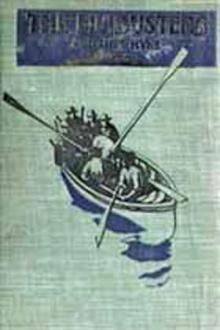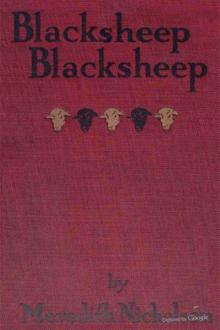The Filibusters - Charles John Cutcliffe Hyne (best english books to read for beginners .TXT) 📗

- Author: Charles John Cutcliffe Hyne
- Performer: -
Book online «The Filibusters - Charles John Cutcliffe Hyne (best english books to read for beginners .TXT) 📗». Author Charles John Cutcliffe Hyne
“Look here,” I cut in, ” our bargain’s made. Any way you draw large profits out of us, and if we come to any sort of grief you get your full dividends out of Lloyds. You have made us insure fully against every possible risk; and it has cost us seventy guineas per cent.; and you have got a Jew’s bargain out of it. You never had such a haul before, and most probably never will again. And now, my friend, go, or possibly someone here will do you a personal injury.”
The fellow went away, whining and grumbling, and I did not anticipate seeing him again. The Fates, however, saw good to throw him in our way afterwards in a rather peculiar manner. But that will be touched upon when the time comes. But let me drop these mean becklings now, and pass on to the period of brisker movement.
The Clarindella put to sea on her appointed day, loaded down to within a. foot of her marks with our war material. Davis was in practical command (though nominally rated as purser), and splendidly he managed. From what port he sailed, how he got his cargo on board and under hatches, how he procured his clearance papers, are matters which must not be told of even now, as to do so would implicate as accomplices many respectable gentlemen who have since in public expended much hard language upon our doings. But sail he did, and that without being suspected, though at the last moment there seemed so much chance (from hints which were given us) of the Clarindella being overhauled on the high seas, that at Davis’s earnest entreaty Briggs and I got over the first portion of the journey on another vessel. He put his plea on the ancient principle of there always being danger in carrying the whole of one’s eggs in a single basket.
In consequence the chief and I ran down to Southampton and took passage across to the West Indies in one of the Royal Mail boats; and then by other means of conveyance, which it would do no particular good to specify, made our way to a certain very lonely rendezvous which had been agreed upon.
The Clarindella arrived a day after her time. She had been sighted off Eastern Cuba, and ordered to heave to by a Spanish gunboat; but not being exactly anxious for an overhaul, had taken to her heels. She had the advantage of nearly three-quarters of a knot in speed, and ran the Don’s masttrucks out of sight in eleven hours.
The scurry had taken her off her course, but she swung back on to it when the night closed down. In consequence she arrived (as I have said) behind her time at the rendezvous, and we had worked up a considerable anxiety. But we were on the keen lookout still, and when the glass showed her climbing up over the further rim of the Caribbean Sea, we slipped down from the mountain perch where we had been standing watch, and made the best of our way to the creek below. An hour later a fisher’s boat took us out to where the steamer was showing the red of her bottom as she lifted over the swells. We boarded her before she had lost her way, exchanged halfa-dozen words with Davis, who had a bag ready packed, and went down into the fisher-boat to go ashore and pick up a mail steamer; and then the telegraph on the upper bridge clanged its message down to the engine-room for once more full steam ahead.
We went into the chart-house, and the master showed us a track chart of the Mexican Gulf, marked with a pencil line from where we then were to a tiny dot which lay off the further coast.
“I don’t fancy this white Tortuga Key of yours, sir,” he said. ” The water’s very shoal all round there.”
“You have the detailed chart I gave you?” the General asked.
The captain produced it, a large piece of stiff paper printed in tiny squares, with an inked outline of an island which curled itself round a protected anchorage, and a series of close soundings for the course of the channel which led into it.
“You may take that as absolutely reliable,” the General said. ” There is (as you see) good water in the fairway, and the leading marks stand out black against white coral sand. If you do not fancy the job, I will take the ship in myself.”
“I am master here,” said the captain sourly, “and give up charge to no one except an authorised pilot who can show me a certificate. I have got my ticket to think about.”
The fellow’s owner had evidently been rubbing the fear of I don’t know what into him; he was nervousness personified; he had barely taken off his clothes since leaving England. Well, it was certainly uncomfortable for him, poor wretch, but it did not matter to us so long as he did not get over-frightened and refuse to go on to the proper destination. We are quite as anxious to land there safely as ever he could be.
Thirty hours later we were slipping along under half-steam, with a lead going continuously, trying to catch the loom of the land through an inky starless night. The soundings dodged about most amazingly, and the skipper on the upper bridge swore, and rang his engines off and off till at last we were reduced to a crawl which barely gave us steerage way. Then from the sky ahead a great cloud bank slid away as though it had been the lid of a box, and through the opening there showed up a plump oval of moon, yellow as brass, which hung low over a sleek black sea. Between us and it lay the island, a small patch of coral rock and sand, glittering like a jewel, and splashed by a pale brazen surf.
The captain gulped out a big sigh and crammed down the handles of the telegraph. The propeller rumbled and splashed astern. The Clarindella gathered way and headed for the channel.
What the Key may have been used for before I do not know to this day; but probably pirates once made rendezvous and re-fitted there; for certainly of the six leading marks two were artificial. Four were placed there by nature, outcrops of nigger-black stone bedded in a waste of milk-white sand. But the outermost mark which perched on the most westerly spit of the Key was a neat drybuilt cairn of purple black coral rock with an inscription on one of the heavier boulders to the effect that ” W Caine, he built it,” whilst the sixfoot obelisk on the beach in the middle of the narrow channel carried both in its pleasantness of structure and the words, ” The mate, his money,” the marks of human handiwork and the evidences of a very human wager.
The chart we had may either have been copied from one made by these former occupiers, or compiled from a fresh survey; which, I never asked, and have no one to tell me here now; but it was very complete and entirely accurate. With it any man with a pair of eyes and a steam vessel that would steer could get into the anchorage with complete ease and certainty; a sailing vessel would have to tow or (even with a leading wind) be very smartly handled; but for a stranger the place was locked. The channel ran as a narrow canal of deep water winding in a quick zigzag between shoals of sand and a maze of reefs both sunk and just awash. There was always a heavy ground swell tumbling in from outside, and no one but a maniac would have tried to force the channel even with leadsmen and a steamer under full command.
This, of course gave us security, and the position of the Key added to it. The White Tortuga lay in the middle of an archipelago of other keys and reefs and shoals, which were highly dangerous to navigate. They were on no ship track; they lay between no two ports; and the Gulf Stream swilled through them in many places at a lusty eight knots. The Sailing Directions marked the neighbourhood as ” highly dangerous,” and shipmasters avoided it as they would a gallows.
For our purpose then the place was wholesome through its sheer loneliness. A year might pass without anything but sea fowl and sea creatures sighting it; and yet the chief entry port of Sacaronduca lay a bare hundred and twenty miles to the westward. There was no inducement for anyone to land on the Key for any ordinary purpose, even if they were blown into its direction. It yielded nothing either to eat or to sell or to make into a picture. The cruel barrenness of it made one sick. There was but one tree in the whole place, a stunted twisted black pine, which clawed with gnarled roots upon a slab of honeycombed rock beyond the head of the bay, and served as the further leading mark to the anchorage. A few hundred blades of grey-green grass peppered here and there over the low dunes made up all the rest of the vegetation. There were neither mangroves, palmettos, sawgrass, nor palms, though the Key was in a latitude where all of these flourish abundantly. Neither could we find the nests of sea fowl. Indeed the Key seemed so sour with brine and loneliness that every living organism, high and low, instinctively avoided it.
But I did not learn these things about the White Tortuga Key the night we steamed into its anchorage. The moon burned strong in the sky till we had made the narrows and passed through them to the bay beyond, and then it was eclipsed behind great rolls of cloud, and we saw it no more. The leadsman sang his chant, and the water shoaled steadily from twelve fathoms into six. Then it was ” let go there forrard,” and the anchor left the hawse pipe with a roar and a splash.
“Well, Birch,” said the General, ” we seem to be prospering so far.”
“Yes,” I said, ” things couldn’t well have gone more smoothly.”
The skipper interrupted. ” I thought,” he said, “that according to you this Key was uninhabited.” The man put up his binoculars again, and once more peered at the beach.
“Do you see anyone?” the General asked sharply.
The captain of the Clarindella put down his glass. ” I wasn’t certain before, but I am now. There are people there as sure as you are here, and it strikes me, General, your little game’s been spotted and made ready for. Now you’ve thought pretty poor value of me because I’ve been a good deal frightened whilst I’ve been bringing this steamboat across to this fancy port of





Comments (0)